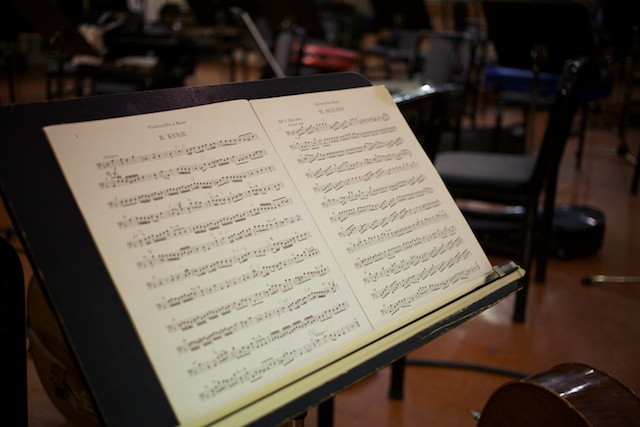By @kixes, re-posted from #spuddings
The performance was short. Extracts from Mozart’s Requiem, voices interwoven with the melodies and harmonies from strings, brass and woodwinds. When it was over there was a short silence before the applause, and members of the chorus raised their arms with the ‘V’ sign. The applause went on and on, and one by one audience members stood up to give the ERT orchestra a standing ovation.
Considering that one of their last official concerts drew a crowd of 1,200, Tuesday night’s reception was a modest one. But the applause went on and on, a rhythmic clap as the orchestra stood for their bows and the conductor hugged the concert master.
After all, who knows how long more this orchestra can go on?
On 11 June 2013, the Greek government made a surprise announcement: the Hellenic Broadcasting Corporation, more usually known as ERT, would be shut down. The decision was effective midnight. Over 2,700 employees working at ERT’s television, radio and magazine departments found themselves without a job.
Shocked and insulted, ERT staff continued to work in defiance of the government. When their transmissions were cut, they began to livestream online (the European Broadcasting Union picked up their stream). The journalists kept reporting, the musicians kept playing, and the protesters at their door hoisted their banners.
Less than a week later the State Council ruled that ERT had to go back on air while it was being restructured, or until a new public broadcaster is formed.
The international press is reporting this court ruling as a “victory”. The three political parties in the Greek coalition government are all claiming a win too. But for the protesters milling about outside ERT’s headquarters, and the tired, stressed-out staff within, the court’s decision was a disappointing letdown and the situation far from ideal.
“I don’t know what’s going to happen. They [the government] don’t know for the moment what to do. They only know that they want to shut down this place or reduce it,” says Vassilis Likos.
Vassilis is the principal cellist of the ERT orchestra. For two decades he has rehearsed and performed a large repertoire of Western classical and Greek compositions with this orchestra, and is proud of the group’s contribution to arts and culture in Greece.
“ERT is close to the people of Greece; it is our main cultural project,” he says. “The ERT orchestra, established in 1938, is the only radio symphony orchestra in Greece. If we’re gone, there is no more radio symphony orchestra in this country.”
For ERT staff like Vassilis, the anxiety comes from the vagueness of the State Council’s decision. ERT is meant to resume broadcast, but no one knows what that means. Will it just broadcast reruns? How many of the staff will be given their jobs back to help the network resume operations? How secure will their jobs be? Does this decision only apply to the journalists? What of the orchestra?
“I can’t believe what’s happening,” he says over and over again. “The only thing I can say is this: they don’t realise what they do.”
The ERT orchestra is not the only casualty. There’s also the folk orchestra, established in 1958, and the chorus, founded in 1977. The disbanding of these three musical outfits will mean that Greece has lost 25% of its orchestras overnight.
As it stands, things don’t look good for the musicians. Labelling ERT a “haven of waste“, the government wants to launch a “leaner” public broadcasting corporation, but the orchestras and chorus can’t get much smaller.
“If the orchestra is really closed then we might start by ourselves,” Vassilis tells us. “We have long friendships and a lot of experience here.”
But starting an orchestra is no easy feat, especially in Greece’s current economic crisis. “People want to listen to our music, but not to pay. As the state orchestra we were able to sell tickets to our concerts at a very low price – €3.50 or €4. How will people afford to go to concerts now?”
The 30 or so people in Tuesday’s audience, crammed at one end of the ERT orchestra’s studio, were mostly family and friends. They were ready with hugs and kind words, but little reassurance. The musicians pack their instruments and begin to head home. No one knows if they will be playing together for much longer. But when we ask Vassilis if we’ll be able to speak with him again, he says, “Yes. I will be back here tomorrow.”


 listen
listen


No comments:
Post a Comment